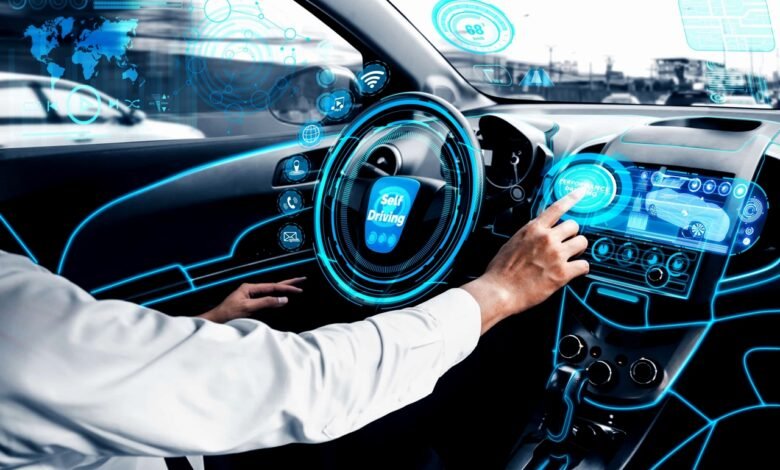
Self-driving cars, also known as autonomous vehicles, have become a significant topic of discussion and innovation in recent years. This revolutionary technology has the potential to reshape the way we travel and interact with transportation systems. In this article, we will delve into the concept of self-driving cars, explore their evolution, highlight their benefits, discuss the challenges and concerns associated with their implementation, explore the future of this technology, and examine the industries impacted by self-driving cars.
Read More: The Most Innovative UK Tech Products of the Year
Introduction
Self-driving cars are vehicles equipped with advanced sensors, artificial intelligence (AI), and machine learning algorithms that enable them to navigate and operate without human intervention. These vehicles rely on a combination of sensors, such as cameras, radar, lidar, and GPS, to perceive their surroundings and make informed decisions.
What Are Self-Driving Cars?
Self-driving cars, as the name suggests, are vehicles capable of driving themselves without human input. They utilize a range of technologies, including sensors, cameras, and AI algorithms, to perceive their environment, analyze data, and make real-time decisions regarding navigation, acceleration, and braking. The goal of self-driving cars is to provide a safer, more efficient, and more convenient mode of transportation.
The Evolution of Self-Driving Technology
The development of self-driving technology has gone through several stages, gradually advancing toward full autonomy. Initially, basic driver-assistance systems such as cruise control and automatic braking were introduced. Over time, more advanced features like lane-keeping assistance and adaptive cruise control emerged. These advancements laid the foundation for fully autonomous vehicles.
In recent years, major players in the automotive and technology industries have invested heavily in self-driving technology. Companies like Waymo, Tesla, and Uber have made significant strides in developing and testing self-driving cars. The evolution of self-driving technology has been fueled by advancements in AI, machine learning, and sensor technologies, enabling vehicles to perceive and interpret their surroundings with greater accuracy and reliability.
Benefits of Self-Driving Cars
Improved Road Safety
One of the primary benefits of self-driving cars is the potential to significantly improve road safety. Human error is a leading cause of accidents on the road, often resulting from factors like distraction, fatigue, or impaired driving. Self-driving cars eliminate these risks by leveraging advanced technologies that can react faster and make more accurate decisions than humans. With improved safety features, self-driving cars have the potential to reduce the number of accidents, injuries, and fatalities on our roads.
Increased Mobility
Self-driving cars have the potential to revolutionize mobility by providing transportation options to those who are unable to drive, such as the elderly or individuals with disabilities. These autonomous vehicles can offer increased mobility and independence to individuals who may otherwise rely on public transportation or assistance from others. By expanding access to transportation, self-driving cars can improve the quality of life for many individuals and enhance overall societal mobility.
Environmental Impact
Self-driving cars can also have a positive environmental impact. Autonomous vehicles can optimize fuel efficiency, reduce congestion through efficient routing, and enable the adoption of electric and alternative fuel-powered vehicles. With the widespread adoption of self-driving cars, we can expect a decrease in greenhouse gas emissions and a transition towards cleaner and more sustainable transportation systems.
Time Efficiency
Another significant benefit of self-driving cars is the potential to reclaim valuable time during travel. With autonomous vehicles, passengers can engage in productive activities or leisure pursuits while the car handles the driving. Commuters can use their travel time more efficiently, be it for work, rest, or entertainment. This time-saving aspect of self-driving cars can improve overall productivity and enhance the travel experience for individuals.
Challenges and Concerns
While the prospects of self-driving cars are promising, several challenges and concerns must be addressed before widespread adoption can occur.
Technological Limitations
Despite significant advancements, self-driving technology still faces limitations. Adverse weather conditions, complex urban environments, and unpredictable human behavior present challenges for autonomous vehicles. Ensuring the reliability and robustness of self-driving technology in all scenarios remains a critical hurdle that needs to be overcome.
Legal and Regulatory Issues
The implementation of self-driving cars raises legal and regulatory challenges. There is a need for clear guidelines and regulations to govern the operation of autonomous vehicles on public roads. Issues related to liability, insurance, and data privacy must be adequately addressed to ensure a smooth transition to a self-driving future.
Ethical Dilemmas
The ethical implications of self-driving cars pose complex questions that require careful consideration. Autonomous vehicles must be programmed to make split-second decisions in situations where accidents are unavoidable. Determining the moral principles to guide these decisions, such as prioritizing passenger safety over pedestrians, presents ethical dilemmas that require thoughtful discussion and consensus.
The Future of Self-Driving Cars
The future of self-driving cars holds immense potential. Advancements in AI and machine learning will continue to enhance the capabilities of autonomous vehicles, making them more reliable, efficient, and safe. Continued investment in infrastructure upgrades, such as smart roads and dedicated lanes, will create an environment conducive to the widespread adoption of self-driving technology. Additionally, public acceptance and confidence in autonomous vehicles will play a crucial role in shaping the future landscape of transportation.
Industries Impacted by Self-Driving Cars
The introduction of self-driving cars will have far-reaching implications across various industries:
Transportation and Logistics
Self-driving cars have the potential to revolutionize the transportation and logistics sector. Delivery services can benefit from autonomous vehicles, reducing costs and increasing efficiency. The automation of logistics processes can streamline supply chains and improve the overall flow of goods and services.
Automotive Industry
The automotive industry is already experiencing significant disruption due to the emergence of self-driving technology. Traditional automakers are partnering with technology companies to integrate autonomous features into their vehicles. Additionally, new players focused solely on autonomous vehicles are entering the market, redefining the landscape of the automotive industry.
Ride-Sharing and Transportation Network Companies
Ride-sharing and transportation network companies like Uber and Lyft are actively exploring self-driving technology. The deployment of autonomous vehicles in their fleets could reduce labor costs and enable round-the-clock service. This shift may redefine the ride-sharing industry and reshape the way we think about transportation.
Insurance and Legal Sectors
The introduction of self-driving cars will also impact the insurance and legal sectors. As the responsibility for accidents shifts from human drivers to autonomous systems, insurance models will need to adapt. Legal frameworks must be updated to address liability and establish guidelines for the operation and regulation of self-driving vehicles.
City Planning and Infrastructure
The integration of self-driving cars into our cities will require careful city planning and infrastructure upgrades. Smart traffic management systems, optimized parking solutions, and dedicated lanes for autonomous vehicles are among the considerations for creating a seamless environment for self-driving cars.
Current Self-Driving Car Initiatives and Projects
Various companies and organizations are actively involved in the development and testing of self-driving cars. Waymo, a subsidiary of Alphabet Inc., is a leader in the field, with extensive real-world testing and a commercial autonomous ride-hailing service. Tesla, known for its electric vehicles, is also at the forefront of self-driving technology, continuously improving its Autopilot system. Additionally, traditional automakers such as Ford, General Motors, and BMW have their self-driving initiatives and partnerships with tech companies to accelerate progress in this area.
Read More: The Rise of Tech Startups in the UK
FAQs
Q1. Are self-driving cars safe? Self-driving cars have the potential to be safer than human-driven vehicles. Their advanced sensor systems and AI algorithms can react faster and make more accurate decisions. However, further development and rigorous testing are necessary to ensure their safety in all scenarios.
Q2. How do self-driving cars navigate without human intervention? Self-driving cars navigate through a combination of sensors, including cameras, radar, lidar, and GPS. These sensors collect data about the vehicle’s surroundings, which is then processed by AI algorithms to make informed decisions about acceleration, braking, and steering.
Q3. Will self-driving cars eliminate jobs for human drivers? The introduction of self-driving cars may impact certain job roles in the transportation and logistics sectors. However, new opportunities may arise in areas such as vehicle maintenance, software development, and monitoring autonomous systems.
Q4. Can self-driving cars operate in adverse weather conditions? Adverse weather conditions, such as heavy rain, snow, or fog, pose challenges for self-driving cars. While significant progress has been made, further advancements in sensor technologies and AI algorithms are required to ensure reliable performance in all weather conditions.
Q5. How long will it take for self-driving cars to become mainstream? The timeline for the widespread adoption of self-driving cars is uncertain and depends on various factors, including technological advancements, regulatory frameworks, and public acceptance. While some autonomous features are already available in vehicles today, fully autonomous vehicles may take several more years to become mainstream.
Conclusion
Self-driving cars have the potential to transform the way we travel, offering improved road safety, increased mobility, environmental benefits, and enhanced time efficiency. However, challenges related to technology, regulation, and ethics need to be addressed for the widespread adoption of autonomous vehicles. As technology continues to evolve and industries adapt, we can look forward to a future where self-driving cars play a significant role in shaping our transportation systems.







